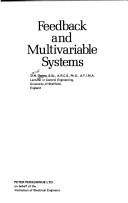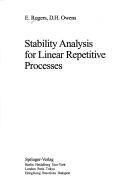| Listing 1 - 9 of 9 |
Sort by
|
Book
ISBN: 0125317204 0125317220 9780125317221 9780125317207 Year: 1981 Publisher: New York, NY : Academic Press,
Abstract | Keywords | Export | Availability | Bookmark
 Loading...
Loading...Choose an application
- Reference Manager
- EndNote
- RefWorks (Direct export to RefWorks)
Control theory --- Control theory. --- Systèmes, Théorie des --- Calcul des variations --- Optimisation --- Controle optimal
Book
ISBN: 1447167708 1447167724 Year: 2016 Publisher: London : Springer London : Imprint: Springer,
Abstract | Keywords | Export | Availability | Bookmark
 Loading...
Loading...Choose an application
- Reference Manager
- EndNote
- RefWorks (Direct export to RefWorks)
This book develops a coherent theoretical approach to algorithm design for iterative learning control based on the use of optimization concepts. Concentrating initially on linear, discrete-time systems, the author gives the reader access to theories based on either signal or parameter optimization. Although the two approaches are shown to be related in a formal mathematical sense, the text presents them separately because their relevant algorithm design issues are distinct and give rise to different performance capabilities. Together with algorithm design, the text demonstrates that there are new algorithms that are capable of incorporating input and output constraints, enable the algorithm to reconfigure systematically in order to meet the requirements of different reference signals and also to support new algorithms for local convergence of nonlinear iterative control. Simulation and application studies are used to illustrate algorithm properties and performance in systems like gantry robots and other electromechanical and/or mechanical systems. Iterative Learning Control will interest academics and graduate students working in control who will find it a useful reference to the current status of a powerful and increasingly popular method of control. The depth of background theory and links to practical systems will be of use to engineers responsible for precision repetitive processes. Advances in Industrial Control aims to report and encourage the transfer of technology in control engineering. The rapid development of control technology has an impact on all areas of the control discipline. The series offers an opportunity for researchers to present an extended exposition of new work in all aspects of industrial control.
Mechanical Engineering - General --- Mechanical Engineering --- Engineering & Applied Sciences --- Intelligent control systems. --- Intelligent control --- Intelligent controllers --- Automatic control --- Systems theory. --- Artificial intelligence. --- Engineering. --- Control and Systems Theory. --- Systems Theory, Control. --- Artificial Intelligence. --- Machinery and Machine Elements. --- Robotics and Automation. --- Construction --- Industrial arts --- Technology --- AI (Artificial intelligence) --- Artificial thinking --- Electronic brains --- Intellectronics --- Intelligence, Artificial --- Intelligent machines --- Machine intelligence --- Thinking, Artificial --- Bionics --- Cognitive science --- Digital computer simulation --- Electronic data processing --- Logic machines --- Machine theory --- Self-organizing systems --- Simulation methods --- Fifth generation computers --- Neural computers --- Control engineering. --- System theory. --- Machinery. --- Robotics. --- Automation. --- Automatic factories --- Automatic production --- Computer control --- Engineering cybernetics --- Factories --- Industrial engineering --- Mechanization --- Assembly-line methods --- Automatic machinery --- CAD/CAM systems --- Robotics --- Automation --- Machinery --- Machines --- Manufactures --- Power (Mechanics) --- Mechanical engineering --- Motors --- Power transmission --- Systems, Theory of --- Systems science --- Science --- Control engineering --- Control equipment --- Control theory --- Engineering instruments --- Programmable controllers --- Curious devices --- Philosophy

ISBN: 0906048036 Year: 1978 Publisher: Stevenage : Peregrinus,
Abstract | Keywords | Export | Availability | Bookmark
 Loading...
Loading...Choose an application
- Reference Manager
- EndNote
- RefWorks (Direct export to RefWorks)
Digital
ISBN: 9781447167723 Year: 2016 Publisher: London Springer
Abstract | Keywords | Export | Availability | Bookmark
 Loading...
Loading...Choose an application
- Reference Manager
- EndNote
- RefWorks (Direct export to RefWorks)
This book develops a coherent theoretical approach to algorithm design for iterative learning control based on the use of optimization concepts. Concentrating initially on linear, discrete-time systems, the author gives the reader access to theories based on either signal or parameter optimization. Although the two approaches are shown to be related in a formal mathematical sense, the text presents them separately because their relevant algorithm design issues are distinct and give rise to different performance capabilities. Together with algorithm design, the text demonstrates that there are new algorithms that are capable of incorporating input and output constraints, enable the algorithm to reconfigure systematically in order to meet the requirements of different reference signals and also to support new algorithms for local convergence of nonlinear iterative control. Simulation and application studies are used to illustrate algorithm properties and performance in systems like gantry robots and other electromechanical and/or mechanical systems. Iterative Learning Control will interest academics and graduate students working in control who will find it a useful reference to the current status of a powerful and increasingly popular method of control. The depth of background theory and links to practical systems will be of use to engineers responsible for precision repetitive processes. Advances in Industrial Control aims to report and encourage the transfer of technology in control engineering. The rapid development of control technology has an impact on all areas of the control discipline. The series offers an opportunity for researchers to present an extended exposition of new work in all aspects of industrial control.
Machine elements --- Applied physical engineering --- Engineering sciences. Technology --- Artificial intelligence. Robotics. Simulation. Graphics --- Computer. Automation --- procesautomatisering --- machine learning --- automatisering --- systeemtheorie --- controleleer --- KI (kunstmatige intelligentie) --- systeembeheer --- machines --- ingenieurswetenschappen --- robots --- regeltechniek --- AI (artificiële intelligentie)

ISBN: 3540552642 0387552642 Year: 1992 Publisher: Berlin : Springer,
Abstract | Keywords | Export | Availability | Bookmark
 Loading...
Loading...Choose an application
- Reference Manager
- EndNote
- RefWorks (Direct export to RefWorks)
Book
Abstract | Keywords | Export | Availability | Bookmark
 Loading...
Loading...Choose an application
- Reference Manager
- EndNote
- RefWorks (Direct export to RefWorks)
Digital
ISBN: 9783540715375 Year: 2007 Publisher: Berlin Heidelberg Springer-Verlag GmbH
Abstract | Keywords | Export | Availability | Bookmark
 Loading...
Loading...Choose an application
- Reference Manager
- EndNote
- RefWorks (Direct export to RefWorks)
Applied physical engineering --- Engineering sciences. Technology --- procesautomatisering --- systeemtheorie --- systeembeheer --- regeltechniek --- informatietheorie
Book
ISBN: 9783540715375 Year: 2007 Publisher: Berlin Heidelberg Springer-Verlag GmbH.
Abstract | Keywords | Export | Availability | Bookmark
 Loading...
Loading...Choose an application
- Reference Manager
- EndNote
- RefWorks (Direct export to RefWorks)
After motivating examples, this monograph gives substantial new results on the analysis and control of linear repetitive processes. These include further applications of the abstract model based stability theory which, in particular, shows the critical importance to the dynamics developed of the structure of the initial conditions at the start of each new pass, the development of stability tests and performance bounds in terms of so-called 1D and 2D Lyapunov equations. It presents the development of a major bank of results on the structure and design of control laws, including the case when there is uncertainty in the process model description, together with numerically reliable computational algorithms. Finally, the application of some of these results in the area of iterative learning control is treated --- including experimental results from a chain conveyor system and a gantry robot system.
Applied physical engineering --- Engineering sciences. Technology --- procesautomatisering --- systeemtheorie --- systeembeheer --- regeltechniek --- informatietheorie
Book
ISBN: 0863410197 Year: 1984 Publisher: London, UK. : Peregrinus on behalf of the Institution of Electrical Engineers,
Abstract | Keywords | Export | Availability | Bookmark
 Loading...
Loading...Choose an application
- Reference Manager
- EndNote
- RefWorks (Direct export to RefWorks)
Automatic control. --- System design. --- Nonlinear control theory.
| Listing 1 - 9 of 9 |
Sort by
|

 Search
Search Feedback
Feedback About UniCat
About UniCat  Help
Help News
News